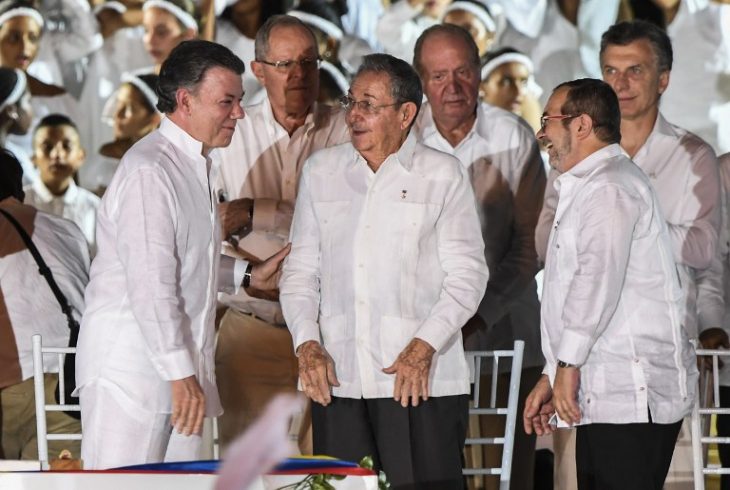Colombia's leftist FARC rebel force signed a historic peace accord with the government Monday and apologized to the countless victims of the country's half-century civil war.
In an emotional open-air ceremony, President Juan Manuel Santos welcomed the communist rebels into the political sphere after signing the accord with FARC leader Rodrigo Londono, alias Timoleon "Timochenko" Jimenez.
Dressed in white, the former mortal enemies signed and shook hands, smiling before an audience of international dignitaries, drawing loud cheers.
The ceremony in the Caribbean coast city of Cartagena followed a four-year process to end the last major armed conflict in the Americas. The accord remains to be ratified by referendum in a week.
"We are being reborn to launch a new era of reconciliation and of building peace," Timochenko said.
"In the name of the FARC, I sincerely apologize to all the victims of the conflict for any pain we may have caused during this war."
Colombian authorities estimate the territorial and ideological conflict has killed 260,000 people, left 45,000 missing and uprooted 6.9 million.
"Let no one doubt that we are moving towards politics without weapons. Let us all prepare to disarm hearts and minds," Timochenko said.
Santos then stepped up to the podium and addressed a message to the thousands of FARC fighters preparing to disarm in their jungle camps.
"When you begin your return to society... as head of state of the homeland that we all love, I welcome you to democracy," he said.
"Swapping bullets for votes and weapons for ideas is the bravest and most intelligent decision that any rebel group could take."
The 2,500 guests at the signing included UN Secretary General Ban Ki-moon, US Secretary of State John Kerry and the Vatican's Secretary of State Pietro Parolin.
An array of Latin American heads of state, including Cuban President Raul Castro, sat near the signatories on stage.
- FARC's political future -
The FARC launched its guerrilla war on the Colombian government in 1964, after a peasant uprising that was crushed by the army.
Over the decades, the conflict drew in several leftist rebel groups, right-wing paramilitaries and drug gangs.
Under the deal, the FARC is now to relaunch as a political party. Timochenko, 57, is expected to remain its leader.
At a remote jungle camp in El Diamante, western Colombia, FARC fighter David Preciado celebrated the accord by playing football with his comrades.
"The government did not defeat us, and we did not defeat them. Our 52 years of war were not in vain," he told AFP.
"We are aware that we have to move forward together, united... to finally achieve victory, giving power to the people by political means."
- Amnesty -
The rebels came to the negotiating table after being weakened by an army offensive led by Santos, 65, when he was defense minister.
After he became president, four years of talks hosted by Cuba yielded a final, 300-page accord last month.
It grants an amnesty for "political crimes" committed during the conflict, but not for the worst atrocities, such as massacres, torture and rape.
The FARC's fighters are to leave their mountain and jungle hideouts and disarm in a UN-supervised process.
Colombian authorities estimate their number at more than 7,000.
- No to 'terrorists' -
Recent polls show the "Yes" camp in the lead to ratify the accord in the referendum on October 2.
Some Colombians resent the concessions made to the FARC, however.
Former president Alvaro Uribe led a demonstration in protest at the signing on Monday.
"The Americans would not grant impunity to Osama Bin Laden. The French would not grant impunity to (Islamist militants) ISIS," he said.
"Why should we Colombians grant total impunity to terrorists?"
Santos told the gathering at the signing ceremony: "I prefer an imperfect accord that saves lives to a perfect war that keeps sowing death and pain."
- FARC off blacklist -
The European Union suspended the FARC from its list of terrorist groups, EU foreign policy chief Federica Mogherini said in a statement.
The government has yet to begin planned peace talks with another, smaller leftist rebel group, the National Liberation Army (ELN), saying it must first stop kidnappings.






